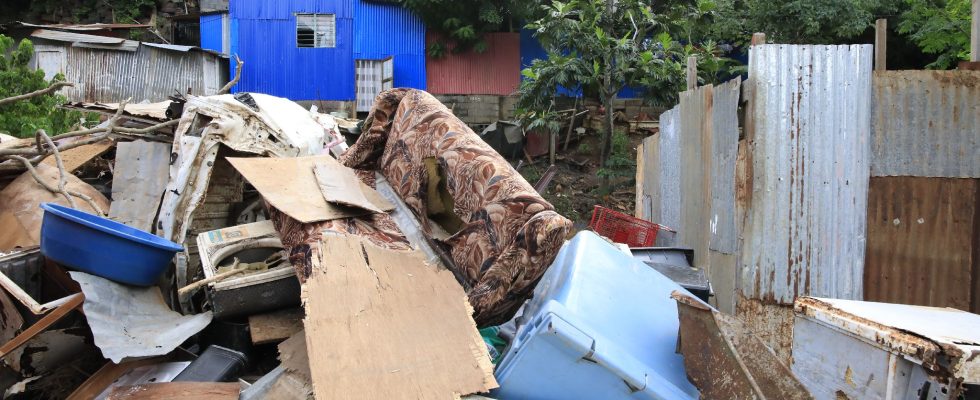The secret is out. Gérald Darmanin was forced to confirm on Friday April 21, with France info and everyday Le Figaro, the upcoming holding of a series of police interventions against delinquency and illegal immigration in Mayotte. This maneuver aims to carry out massive expulsions of foreigners in an irregular situation and destroy the many slums that are multiplying in the archipelago.
Baptized “Wuambushu”, this anti-migrant operation was revealed at the end of February by The chained Duck. If the Minister of the Interior assured that the discreet operation had been validated by Emmanuel Macron in the Defense Council, it feeds the concern of human rights defenders and raises a certain number of questions.
How should the police operation unfold?
In Mahorais, the “Wuambushu” operation means “recovery” or “itchy hair”. It aims to fight against illegal immigration by destroying the makeshift homes of undocumented people, most of whom come from the neighboring island, the Comoros, located only 70 kilometers away. More than 2,500 agents (law enforcement, regional health agency, justice, health reserve) are mobilized, according to a source quoted by AFP. The timing of the operation is not yet known.
This kind of maneuver is not new. Several so-called “decasing” operations, sometimes carried out by islanders who formed militias to destroy illegal dwellings, have already taken place since 2016. For his part, Gérald Darmanin announced the objective of destroying 1,000 houses “within two months”. “We will take the time necessary […] always with the authorization of the judge, because it goes without saying that we relocate people in accordance with the law”, he affirmed to the Figaro.
Why does the State deem it necessary to carry it out?
Mayotte faces a unique demographic and migratory situation. The archipelago attracts thousands of migrants every year, arriving by sea in makeshift boats called “kwassa kwassa”. They most often arrive from the neighboring Comorian island of Anjouan, but also migrate from Africa’s Great Lakes and increasingly from Madagascar. Now, nearly half of the 350,000 inhabitants of Mayotte do not hold French nationality.
These illegal migrants, settled in particularly unhealthy neighborhoods, in small huts called “bangas”, are particularly affected by violence and trafficking. They mostly live odd jobs gleaned here and there. The population and elected officials accuse them in part of unbalancing the island’s few infrastructures and resources. They also hold them responsible for the “non-standard” delinquency rate, as INSEE indicated in 2021, with in particular a theft rate three times higher than in mainland France.
In this context of escalating violence, Gérald Darmanin considered it urgent to intervene: “Children can no longer go to school without risking being attacked. The roadblocks erected on the roads are scaring away medical personnel. […] It is a situation of aggravated delinquency to which we must respond with great firmness”, he explained, still at the Figaro.
Is the transaction disputed?
If it is supported by certain elected officials, like the deputy LR Mansour Kamardine, who share the semantics of the Minister of the Interior, the operation is particularly reprimanded by human rights associations. The president of the National Consultative Commission on Human Rights, Jean-Marie Burguburu, wrote to the former mayor of Tourcoing to urge him to “give up” this project. He considers that the action of the police risks leading to the “worsening of fractures and social tensions in an already very fragile context”. He is just as alarmed by the “attack on respect for the fundamental rights of foreigners in the context of mass expulsions”.
Many voices also point to the inefficiency of previous operations of this kind. The League of Human Rights is moved by the fact that France is preparing to place “minors in situations of intolerable vulnerability and danger”. “The actions announced […] particularly worry me”, added the Defender of Rights Claire Hédon, announcing the arrival of four of her delegates on the spot. “Wuambushu” also worries the population and fuels tensions with the Comoros.
Why does it create diplomatic tensions with the Comoros?
This operation revives an old dispute between France and the Comoros. For nearly fifty years, the Comoros have claimed their sovereignty over Mayotte, which remained French after the independence of the archipelago in 1974. Above all, the Comorian government does not intend to welcome the expelled. President Azali Assoumani, who has held the presidency of the African Union since February, told AFP that he hoped “that the operation will be canceled”, acknowledging “not having the means to stop (it) by force “.
This Saturday, April 22, he called Paris to “dialogue”. “We favor the search for new perspectives to find a solution to this unpleasant dispute,” he added with a serious face, dressed in a long black ceremonial coat and a kofia, a traditional cap. The Comorian leaders are therefore feverishly waiting for the French executive to specify the date of its operation.
